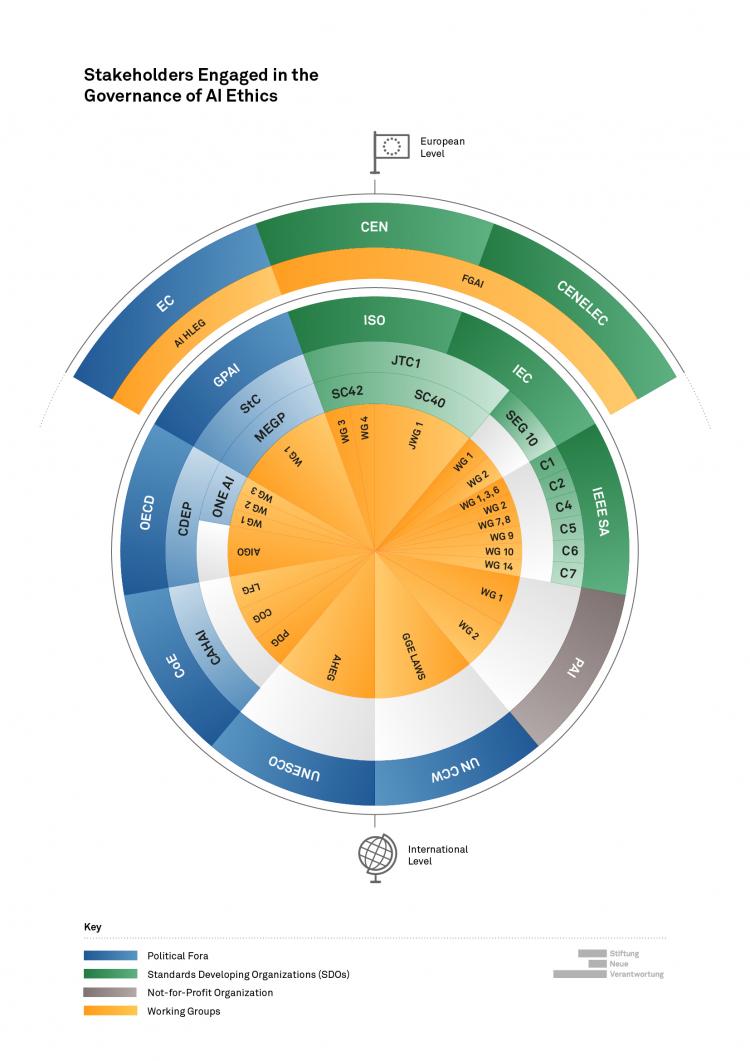Report by Philippe Lorenz: “Shaping international norms around the ethics of Artificial Intelligence (AI) is perceived as a new responsibility by foreign policy makers. This responsibility is accompanied by a desire to play an active role in the most important international fora. Given the limited resources in terms of time and budget, foreign ministries need to set priorities for their involvement in the governance of AI. First and foremost, this requires an understanding of the entire AI governance landscape and the actors involved. The intention of this paper is to take a step back and familiarize foreign policy makers with the internal structures of the individual AI governance initiatives and the relationships between the involved actors. A basic understanding of the landscape also makes it easier to classify thematic developments and emerging actors, their agendas, and strategies.
This paper provides foreign policy practitioners with a mapping that can serve as a compass to navigate the complex web of stakeholders that shape the international debate on AI ethics. It plots political fora that serve as a platform for actors to agree upon ethical principles and pursue binding regulation. The mapping supplements the political purview with key actors who create technical standards on the ethics of AI. Furthermore, it describes the dynamic relationships between actors from these two domains. International governance addresses AI ethics through two different dimensions: political fora and Standards Developing Organizations (SDOs). Although it may be tempting to only engage on the diplomatic stage, this would be insufficient to help shape AI policy. Foreign policy makers must tend to both dimensions. While both governance worlds share the same topics and themes (in this case, AI ethics), they differ in their stakeholders, goals, outputs, and reach.
Key political and economic organizations such as the United Nations (UN), the Organisation for Economic Co-operation and Development (OECD), and the European Commission (EC) address ethical concerns raised by AI technologies. But so do SDOs such as the International Organization for Standardization (ISO), the International Electrotechnical Commission (IEC), and the IEEE Standards Association (IEEE SA). Although actors from the latter category are typically concerned with the development of standards that address terminology, ontology, and technical benchmarks that facilitate product interoperability and market access, they, too, address AI ethics.
But these discussions on AI ethics will be useless if they do not inform the development of concrete policies for how to govern the technology.
At international political fora, on the one hand, states shape the outputs that are often limited to non-binding, soft AI principles. SDOs, on the other hand, tend to the private sector. They are characterized by consensus-based decision-making processes that facilitate the adoption of industry standards. These fora are generally not accessible to (foreign) policy makers. Either because they exclusively cater to private sector and bar policy makers from joining, or because active participation requires in-depth technical expertise as well as industry knowledge which may surpass diplomats’ skill sets. Nonetheless, as prominent standard setting bodies such as ISO, IEC, and IEEE SA pursue industry standards in AI ethics, foreign policy makers need to take notice, as this will likely have consequences for their negotiations at international political fora.
The precondition for active engagement is to gain an overview of the AI Governance environment. Foreign policy practitioners need to understand the landscape of stakeholders, identify key actors, and start to strategically engage with questions relevant to AI governance. This is necessary to determine whether a given initiative on AI ethics is aligned with one’s own foreign policy goals and, therefore, worth engaging with. It is also helpful to assess industry dynamics that might affect geo-economic deliberations. Lastly, all of this is vital information to report back to government headquarters to inform policy making, as AI policy is a matter of domestic and foreign policy….(More)”.
